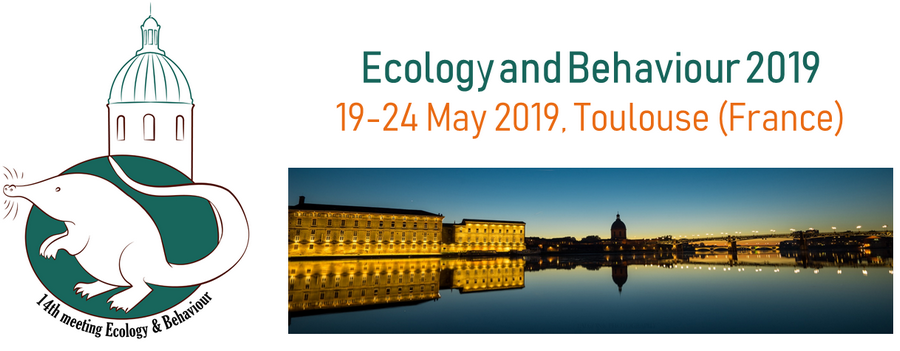1) Sexual selection and parental care
Charlotta Kvarnemo
Sexual selection, male care and sperm competition
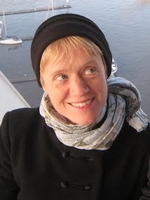
Charlotta Kvarnemo is a full professor in the Department of Biological and Environmental Sciences at the University of Gothenburg in Sweden. Her work explores a broad range of questions linked to sexual selection, mainly in animals with male care, investigated from a behavioural and evolutionary ecological perspective. She is particularly interested in questions related to the evolution of parental care, mating systems, sperm competiton, operational sex ratio, filial cannibalism, as well as processes of local adaptation of native and invasive species. Her work is mainly experimental and theoretical, but in collaboration with others, her approaches have also included phylogenetic, genetic as well as modelling techniques. Most of her empirical work is done on fish (gobies, pipefishes and seahorses), but she has also done some work on insects (two species of Australian bushcrickets).
Etienne Danchin
Cultural transmission and epigenetics
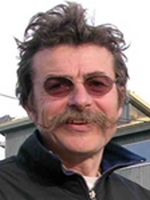
Etienne Danchin is Directeur de Recherche (DRCE) CNRS at the Laboratoire Evolution et Biodiversité Biologique (EDB) and co-head of the LabEx TULIP. His research mainly deals with non-genetic inheritance, and more specifically cultural heredity and epigenetic heredity. He has several projects varying from experimental cultural transmission of mating preferences in the fruit fly Drosophila melanogasterand the mosquitofish Gambusia holbrooki, epigenetic inheritance in pea aphids (Acyrthosiphon pisum) and theoretical approaches to non-genetic inheritance to strict monogamy in Kittiwakes (Rissa tridactyla).
2) Ecophysiology and Ecotoxicology
Lieven Bervoets
Fates and effects of contaminants in aquatic ecosystems
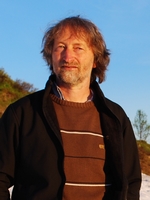 Lieven Bervoets is a full professor in the department of biology at antwerp university (Belgium). He’s interested by the effects of stressors on organisms. More specifically, his research focuses on fates and effects of contaminants (e.g. trace metal elements, organic compounds and microplastics) in aquatic ecosystems. His studies are based on both field assessment and experimental approaches and aiming to assess effects of contamination on individuals (mostly macroinvertebrates and fish) as well as on communities structure.
Lieven Bervoets is a full professor in the department of biology at antwerp university (Belgium). He’s interested by the effects of stressors on organisms. More specifically, his research focuses on fates and effects of contaminants (e.g. trace metal elements, organic compounds and microplastics) in aquatic ecosystems. His studies are based on both field assessment and experimental approaches and aiming to assess effects of contamination on individuals (mostly macroinvertebrates and fish) as well as on communities structure.
Mathieu Giraudeau
Vertebrate ecophysiology
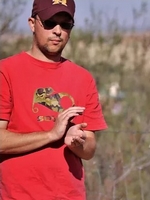
Mathieu Giraudeau is a CNRS researcher at Centre de recherche Ecologiques et Evolutive sur le Cancer (CREEC) where he studies the effect of Human activities on oncogenic process on wildlife. He previously held several postdoc position in USA, Switzerland, Australia and UK. Amongst others, he had investigated behavioral and physiological consequences of prenatal conditions, urbanization and radiation exposure in wild birds and frogs. He is currently associate editor for BMC Zoology and review editor in Behavioral and Evolutionary Ecology for Frontiers in Ecology and Evolution.
3) Phylogenetic and population genomics
Knud Jønsson
Biogeography of Indo-Pacific birds
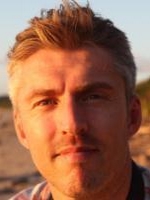
Knud Jønsson is a a molecular systematist, biogeographer and evolutionary ecologist combining fieldwork with lab work. He is fascinated by life on Earth and his research focuses on (corvoid) passerine birds in the Indo-Pacific island region and beyond. He strives to answer questions pertaining to origin, dispersal, differentiation, adaptation and persistence and ultimately what shaped the contemporary diversity and distribution of birds. His work focuses on both the largest and smallest spatio-temporal scales and draws on new sequencing and tracking technology. He is currently an associate professor in Copenhague in the Natural History Museum of Danemark.
Ludovic Orlando
Paleogenomics of mammalian populations
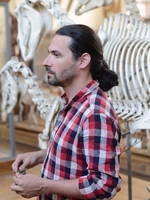
How much major palaeo-environmental changes have shaped the geographic structure and demographic profiles of mammalian populations has been a recurrent theme in the research of Ludovic Orlando and his team. His main research area is the use of ancient DNA to reconstruct the evolutionary history of one iconic mammal: the horse. With his team, they have generated the oldest genome characterized so far, that of Yukon horse aged of 700,000 years. They also have characterized the complete genomes of several Pleistocene horses together with the genomes of a variety of modern domestic breeds and we are currently scanning those genomes in order to identify the genetic changes that were specifically selected during horse domestication. Finally, they have devised methods to track epigenetic changes over evolutionary times. He started his own research group in 2010 at the Centre for GeoGenetics, Univ. of Copenhagen, Denmark and is now the Deputy Director of the Laboratory of Anthropo-Biology in Toulouse, France.
4) Social interactions and transmission
Lucy Aplin
Cultural transmission in birds
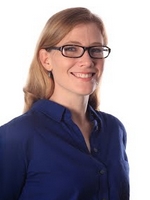
Lucy Aplin is the head of the newly formed Cognitive and Cultural Ecology Group at the Max Planck for Ornithology, Radolfzell and a research associate at the Edward Grey Institute, University of Oxford. Before, she did her PhD jointly at the Australian National University and the University of Oxford. She used social network analysis to investigate individual variation in behaviour and social information use in tits. After her PhD, she remained at Oxford, first as a BBSRC Postdoctoral Research with Prof. Ben Sheldonto investigate the social dynamics associated with the transmission of information in great tits, and in autumn 2015 as a Junior Research Fellow at St John's College, University of Oxford (until Oct 2017) studying the evolution and ecology of cultural inheritance in non-human animals. Now, at Radolfzell, her research group explores the interactions between cognition, social dynamics and animal culture, mostly in wild populations of birds, with a focus on how cognition and culture relate to behavioural ecology.
Michael Wilson
Behavior and ecology of non-human primates
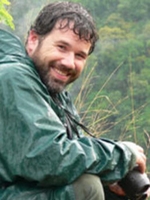 Michael Wilson is an Associate Professor of Anthropology at the University of Minnesota, USA, with a joint appointment in the Department of Ecology, Evolution and Behavior. His work explores the behavior and biology of chimpanzees, focusing on intergroup relations (aggression, territorial behavior, communication, disease ecology) in chimpanzees from Gombe National Park (Tanzania) and Kibale National Park (Uganda). His approaches include field experiments and analysis of long-term data on intergroup aggression and other territorial behaviors.
Michael Wilson is an Associate Professor of Anthropology at the University of Minnesota, USA, with a joint appointment in the Department of Ecology, Evolution and Behavior. His work explores the behavior and biology of chimpanzees, focusing on intergroup relations (aggression, territorial behavior, communication, disease ecology) in chimpanzees from Gombe National Park (Tanzania) and Kibale National Park (Uganda). His approaches include field experiments and analysis of long-term data on intergroup aggression and other territorial behaviors.
5) Cognition: learning and memory
Alice Auersperg
Innovativeness and tool manufacture in birds
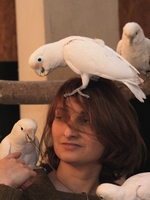
Alice Auersperg is an ethologist and leader of the Goffin lab at the Messerli Research Institute in Austria. Her current research explores innovativeness, object play and tool manufacture in parrots (Keas and Goffin's cockatoos) and she has recently started a project on cognitive ecology of the Goffin's cockatoo in Indonesia. Even if most of her empirical work is done on parrots, she has also done some work on corvids (object play) and great apes (problem solving strategies).
Audrey Dussutour
Cognition in ants and slime molds
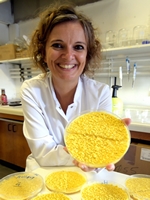
Audrey Dussutour is a CNRS researcher at Centre de Recherches sur la Cognition Animale (CRCA) and head of the team IVEP where she studies the behavior of ants and unicellular organisms. Before she did her postdoc in in Australia and Canada and hold also positions in Belgium and Sweden. She is associate editor of three prestigious scientific journals and has won numerous awards for her work and papers.The objective of the IVEP team is to develop an integrative approach to investigate the determinants of phenotypic plasticity across different biological scales. Phenotypic plasticity is the capacity of a given genotype to produce a diversity of phenotypes in response to variations in the environment and represents one of the most important ways by which organisms adaptively respond to the environment. Audrey Dussutours research focusses on the interaction of nutrition and cognition and its implications for swarm intelligence in invertebrates and protists.
6) Interspecific interactions
Camille Bonneaud
Evolutionary ecology of host-pathogen interactions
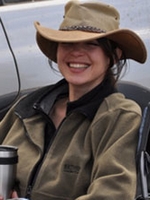 Camille Bonneaud is a senior lecturer in evolutionary biology at the University of Exeter. Her research focuses on the evolutionary ecology of host-pathogen interactions in natural populations, mainly of birds. She is particularly interested in understanding how emerging infectious pathogens jump into new host species and how they subsequently adapt to these novel host environments, as well as how host resistance/tolerance evolves following epizootic outbreak. One of her main study systems is an endemic bacterium of poultry which jumped into a common North American passerine (House finch) causing a devastating epizootic that killed millions of these birds. She also use nest-box populations of great tits and blue tits on an altitudinal gradient of the French Pyrenees to examine how climate change might affect the interaction between malaria parasites and their avian hosts.
Camille Bonneaud is a senior lecturer in evolutionary biology at the University of Exeter. Her research focuses on the evolutionary ecology of host-pathogen interactions in natural populations, mainly of birds. She is particularly interested in understanding how emerging infectious pathogens jump into new host species and how they subsequently adapt to these novel host environments, as well as how host resistance/tolerance evolves following epizootic outbreak. One of her main study systems is an endemic bacterium of poultry which jumped into a common North American passerine (House finch) causing a devastating epizootic that killed millions of these birds. She also use nest-box populations of great tits and blue tits on an altitudinal gradient of the French Pyrenees to examine how climate change might affect the interaction between malaria parasites and their avian hosts.
Frédéric Santoul
Interactions between indigenous and exotic predators, impact on aquatic food webs structure
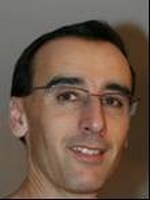 Frédéric Santoul is an assistant professor at University Toulouse III - Paul Sabatier. His research theme aims at determining how top-predator fish species introduction can influence aquatic communities and ecosystems. He seeks to identify sources of carbon (13C) and trophic levels (15N) involved in the biological interactions, in order to identify the influence of introductions of exotic species on : i) the niche trophic overlap / shift between native and introduced species, and ii) the carbon flow in food webs.
Frédéric Santoul is an assistant professor at University Toulouse III - Paul Sabatier. His research theme aims at determining how top-predator fish species introduction can influence aquatic communities and ecosystems. He seeks to identify sources of carbon (13C) and trophic levels (15N) involved in the biological interactions, in order to identify the influence of introductions of exotic species on : i) the niche trophic overlap / shift between native and introduced species, and ii) the carbon flow in food webs.
7) Conservation and global change ecology
Mike Bruford
Conservation genomics

Mike Bruford is a molecular ecologist interested in studying the demographic and evolutionary processes affecting populations, species and ecosystems of conservation concern. His group focuses on elucidating the determinants of genomic diversity, population structure and fitness at a variety of spatio-temporal scales. These include studying the behaviour and movements of individuals within their breeding territories, examining how demography and social structure interact with genetic diversity in fragmented ecosystems through to understanding the partitioning of genomic diversity in species with high vagility and continent-wide ranges. He focusses his projects on trying to understand basic evolutionary processes in endangered species but he also places substantial emphasis on provision of data and recommendations to management authorities for action and policy development. He is currently a co-Director of the Sustainable Places Research Institute in Cardiff, United Kingdom.
Camille Parmesan
Climate change impact
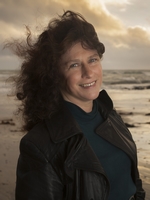 Camille Parmesan is a Director of Research at the Theoretical and Experimental Ecology station in Moulis, France and a Senior Researcher at the Environmental Science Institute, University of Texas at Austin, U.S.A. She is also a professor at the School of Marine and Biological Sciences in Plymouth University, UK and at the Department of Geological Sciences, University of Texas at Austin, U.S.A. Her research focuses on the impacts of climate change on wild plants and animals. It spans from detailed field-based work on individual butterfly species and communities to synthetic analyses of global impacts on a broad range of plants and animals across terrestrial and marine biomes. She received many scientific distinctions and was the first author of the "most highly-cited research paper" in the field of "climate change: (Parmesan & Yohe Nature 2003). She worked with the Intergovernmental Panel on Climate Change for 20+ years and is actively involved with governmental agencies and NGOs to help develop conservation assessment and planning.
Camille Parmesan is a Director of Research at the Theoretical and Experimental Ecology station in Moulis, France and a Senior Researcher at the Environmental Science Institute, University of Texas at Austin, U.S.A. She is also a professor at the School of Marine and Biological Sciences in Plymouth University, UK and at the Department of Geological Sciences, University of Texas at Austin, U.S.A. Her research focuses on the impacts of climate change on wild plants and animals. It spans from detailed field-based work on individual butterfly species and communities to synthetic analyses of global impacts on a broad range of plants and animals across terrestrial and marine biomes. She received many scientific distinctions and was the first author of the "most highly-cited research paper" in the field of "climate change: (Parmesan & Yohe Nature 2003). She worked with the Intergovernmental Panel on Climate Change for 20+ years and is actively involved with governmental agencies and NGOs to help develop conservation assessment and planning.
